DACARBAZINE - INJECTION
PHONETIC PRONUNCIATION: (duh-KAR-buh-zeen)
COMMON BRAND NAME(S): DTIC-Dome
GENERIC NAME(S): dacarbazine
Uses
USES: Dacarbazine is used to treat certain types of cancer, such as skin cancer that has spread (metastatic malignant melanoma) and Hodgkin's disease. It is a cancer chemotherapy drug that is used alone or with other medications to slow or stop cancer cell growth.
How to use DACARBAZINE - INJECTION
HOW TO USE: This medication is given by injection into a vein by a health care professional. It is given on a schedule as directed by your doctor. Dosage is based on your medical condition, body size, and response to treatment.
Side Effects
Precautions
Interactions
Overdose
Images
Reviews
Faq for DACARBAZINE - INJECTION
Dacarbazine injection is used to treat certain types of cancer, including Hodgkin's lymphoma, melanoma, and soft tissue sarcoma.
Dacarbazine injection is given by a healthcare professional through a vein (intravenously) over a period of time, typically every 2-3 weeks.
The common side effects of dacarbazine injection may include nausea, vomiting, loss of appetite, fatigue, hair loss, increased susceptibility to infections, and bone marrow suppression.
The response to dacarbazine injection varies depending on the type and stage of cancer being treated. It may take several weeks or even months for the medication to start showing its effects.
It is important to inform your healthcare provider about any existing medical conditions, ongoing medications, or allergies before starting dacarbazine injection. It is also crucial to follow all safety precautions, such as practicing good hygiene and avoiding contact with people who have infections.
Dacarbazine injection may harm an unborn baby and is not recommended for use during pregnancy. It is advised to avoid breastfeeding while receiving dacarbazine injection, as it may pass into breast milk and harm the nursing baby.
There are several medications that may interact with dacarbazine injection, including live vaccines, phenobarbital, warfarin, and certain antibiotics. It is important to inform your healthcare provider about all the medications you are taking to avoid any potential interactions.
Dacarbazine injection may be used in certain cases for children, but the dosage and administration should be determined by a specialized pediatric oncologist.
It is essential to keep all appointments for dacarbazine injection. However, if you do miss a scheduled dose, it is important to contact your healthcare provider for further instructions.
Warning
WARNING: This medication may often cause serious blood disorders (decreased bone marrow function leading to a low number of red blood cells, white blood cells, and platelets). These effects can cause anemia, lower your body's ability to fight an infection, and increase your risk of bleeding. Dacarbazine may also cause rare but serious liver problems. These side effects may rarely be life-threatening. Your doctor will monitor you closely while you are receiving this medication. Tell your doctor right away if you develop any of the following symptoms: unusual tiredness, pale skin, easy bruising/bleeding, signs of infection (e.g., fever, chills, persistent sore throat), persistent nausea/vomiting, dark urine, yellowing eyes/skin, stomach/abdominal pain.
Disclaimer
IMPORTANT: HOW TO USE THIS INFORMATION: This is a summary and does NOT have all possible information about this product. This information does not assure that this product is safe, effective, or appropriate for you. This information is not individual medical advice and does not substitute for the advice of your health care professional. Always ask your health care professional for complete information about this product and your specific health needs.
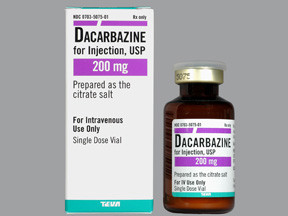
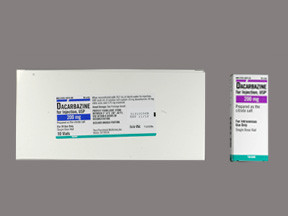
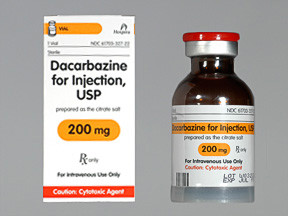
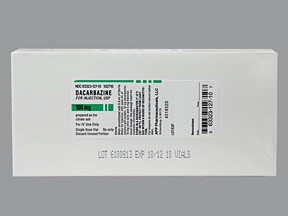
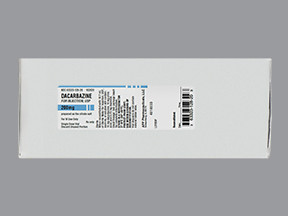
No Reviews Yet